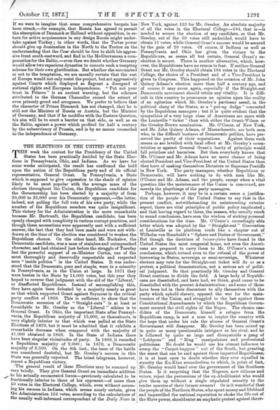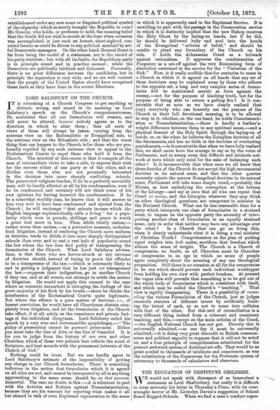THE - ELECTIONS IN THE UNITED STATES: T HIS - week the contest
for the Presidency of the United States has been practically decided by the State Elec- tions in Pennsylvania, Ohio, and Indiana. As we have for
some weeks anticipated, the result has confirmed the hold upon the nation of the Republican party and of its official representative, General Grant. In Pennsylvania, a State which is supposed to give expression to the shade of opinion likely to be most popular• with the average mass of the
electors throughout the Union, the Republican candidate for the Governorship has been elected by a majority of from 20,000 to 25,000 over his Democratic opponent,—the latter, indeed, not polling the full vote of his own party, while the number- of the Republican seceders was quite insignificant. This victory for the Administration is the more remarkable because. Mr. Hartranft, the Republican candidate, has been openly charged with complicityiñ various corrupt practices, and though these accusations were apparently met with a sufficient answer, the fact that they had been made and were not with- drawn at the time of the election was considered to weaken the Republican- chance. On the other hand, Mi.. Buckalew, the Democratic candidate, was a man of stainless and unimpeached character, and had obtained just. before the struggle of Tuesday last the powerful support of ex-Minister Curtin, one of the most thoroughly and deservedly respectable and respected men "inside politics" in the United States. It was under- stood that the Demoerats, pure and simple, were in a minority in Pennsylvania, as in the ITnion at large. In 1871 they were beaten in the State by 14,000 votes, but this year they hoped to reverse that judgment with the aid of the "Liberal," or disaffected Republicans. Instead of accomplishing this, they have again been defeated by a majority nearly as great as that which supported Grant against Seymour in the critical party conflict of 1868. This is sufficient to show that the Democratic secession of the " Straight-outs " is at least as formidable to Mr. Greeley as the "Liberal" schism is to General Grant. In Ohio, the important State after Pennsyl- vania, the Republican majority of 15,000, or thereabouts, is very slightly inferior to that which was polled at the State Elections of1870, but- it must be admitted that it exhibits a remarkable decrease when compared with the majority of 41,000 obtained. in 1868. In the State of Indiana there have been singular vicissitudes of party. In 1868, it recorded a Republican majority of 9,000; in 1870, a Democratic majority of 2;500. On the 8th inst., the issue of the battle was considered doubtful, but Hr. Greeley's success in this State was generally expected. The latest telegrams, however, report a Republican victory.
-The general result or these Elections may be summed up very briefly. They give General Grant an immediate addition to his actually, enumerated forces—previously calculated to be fractionally inferior to those of his opponent—of more than 50 votes in the Electoral Colfege, which, even without assum- ing his success in Indiana, which seems nearly certain, gives the Administration 164 votes, according to the calculations of the usually well-informed correspondent of the Daily News in New York, against 133 for Mr. Greeley. An absolute majority of all the votes in the Electoral College-184, that is—is needed to secure the election of any candidate, so that Mr. Greeley, out of the 69 votes still undecided, would have to obtain 51 votes, while General Grant's success would be assumed by the gain of 20 votes. Of course, if Indiana as well as
Pennsylvania and Ohio has given the victory to the Republicans, as seems all but certain, General Grant's re- election is secure. There is another alternative, which, how- ever, the Republicans have no reason to fear. If neither General Grant nor Mr. Greeley should obtain 184 votes in the Electoral'
College, the choice of a President and of a Vice-President is given to Congress. This happened on the occasion of Mr. John Quincy Adams's election more than half a century ago, and of course it may occur again, especially if the Straight-out' Democratic movement should retain any vitality. It is diffi- cult in this country to pronounce an opinion upon the reality of an agitation which Mr. Greeley's partisans assail, in the' political slang of the States, as a" put-up dodge" concocted by the Republican managers ; but it is quite evident that the sympathies of a very large class of Americans are more with the Louisville " ticket " than with. either the Grant-Wilson or' the Greeley-Brown nomination. Mr. O'Conor, of New York, and Mr. John Quincy Adams, of Massachusetts, are both men.
who, in the difficult business of Democratic politics, have pre- served the purity of their reputations. Against them such sneers as are levelled with fatal effect at Mr. Greeley's eccen- tricities or against General Grant's laxity of principle would fall pointless and harmless. But then-everybody knows that Mr. O'Conor and Mr. Adams have no more chance of being elected-President and Vice-President of the United States than they have of making themselves Dictators or Supreme Pontiffs in New York, The party managers, whether Republican or Democratic, will have nothing to do with men like Mr. O'Conor and Mr. Adams, and ttre people, except when a vital question like the maintenance of the Union is concerned, are merels the playthings of the partyrmanagers.
Perhaps, however, it may be in a.certain sense a justifica- tion of the people of the United States to say that in the present conflict, notwithstanding its uninteresting exterior aspect, there are vital principles of public policy implicated ; and that having regard to them, the masses, who usually reach to sound conclusions, have seen the wisdom of sinking personal considerations for the time. Mr. O'Conor's exceedingly able letter which was adopted by the " Straight-out " Convention at Louisville as its platform reads like a chapter out of Wilhelm von Humboldt's "Sphere and Duties of Government." But though the doctrines of laisser-faire have found in the United States the most congenial home, not even the Ameri- cans are prepared to carry them to Mr. O'Conor's extreme conclusions, which extend even to the refusal of the power of borrowing to States, sovereign or semi-sovereign. Whatever
electors may vote for the Straight-out ticket will do so as a protest, a political demonstration, not a serious act of politi-
cal judgment. So that practically Mr. Greeley and General Grant continue to divide the field. A large body of Republi- cans are dissatisfied, and have had, we think, good cause to be dissatisfied with the present Administration; and some of these have been led in their discontent to ally themselves with the party which upheld slavery, opposed the war for the main- tenance of the Union, and struggled to the last against those Constitutional Amendments by which the Republican Govern- ment secured the civil rights of the Negro. The chosen can- didate of the Democrats, himself a refugee from the Republican camp, is not a man to inspire the country with the hope that under his rule the abuses of General Grantis- Government will disappear. Mr. Greeley has been mixed up in quite as many questionable intrigues as his rival, and he is followed by quite as large and disreputable a gang of "Lobbyers" and " Ring " manipulators and professional. politicians. No doubt he would use his utmost influence to sweep the " Carpet-baggers " out of the South, but granting, the worst that can be said against these imported Republicans; it is at least open to doubt whether they ever equalled in atrocity the Ku-Klux scoundrelism to which, in point of fact,. Mr. Greeley would hand over the government of the Southern States. Is it surprising that the Negroes, now citizens and voters, reject the pretensions of the ex-Abolitionist who would give them up without a single stipulated security to the tender mercies of their former owners? Or is it wonderful that the people of the Northern States, who spent money and lifeblood and impenilled the national reputation to choke the life out of the Slave power, should enter an emphatic protest against there- establishment under any new name or disguised political symbol of the oligarchy which so nearly brought the Republic to ruin? Mr. Greeley, who holds, or professes to hold, the amazing belief that the South did not wish to secede at the time when secession was accomplished, is just such an honest, short-sighted, con- ceited fanatic as could be driven to any political mischief by art- ful Democratic managers. On the other hand, General Grant is far from being the model of a statesman, nor is the record of his party stainless ; but with all its faults, the Republican party is in principle sound and in practice earnest ; while the Democrats are politically faithless and dishonest. Personally, there is no great difference between the candidates, but in principle the separation is very wide, and we are well content that the people of the United Skates should have recognised these facts as they have done in the recent Elections.



































 Previous page
Previous page